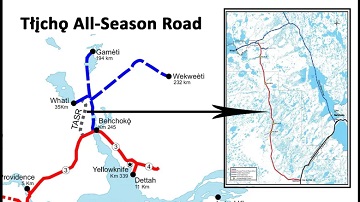 Tuesday, April 30, 2024
Tuesday, April 30, 2024  Tuesday, April 30, 2024
Tuesday, April 30, 2024 
Contractors working on the Tlicho all-season road are going ahead with work without proper approvals from the Wek’e’zhii Land and Water Board, but so far no action has been taken against the lead agency on the project, the Northwest Territories Department of Infrastructure.
“The Board has become aware that several quarries of the Tlicho All-Season Road Project have been constructed without first receiving approval from the Board, as required by law,” wrote Joe Mackenzie, Chair of the Wek’e’zhii Land and Water Board in a Dec. 20 letter to the department.
Under the terms of the water licence and land use permit authorizing construction of the road, the department is required to submit detailed plans for any new quarries at least 90 days before starting to quarry.
Despite repeated reminders from the board that the plans and board approval of them are required, new quarries have been developed without them.
“GNWT-INF has consistently failed to provide submissions to the Board according to the timelines required by the Licence, Permit and direction of the board,” wrote Mackenzie.
Construction of the 97 km two-lane gravel road from Highway 3 to Gameti began in the fall. Though the water licence and land use permit were issued to the Government of the Northwest Territories’ Department of Infrastructure, the road is being designed and built by its P3 partner Northstar Infrastructure, a consortium composed of Kiewit Canada Development Corp. and the Tlicho government, with Peter Kiewit Sons ULC, Hatch Corp. and Thurber Engineering Ltd. as design and engineering partners.
The quarrying plans require, among other things, geotechnical analysis to ensure the material to be quarried does not pose a risk of acidic chemicals or heavy metals leaching into the surrounding environment.